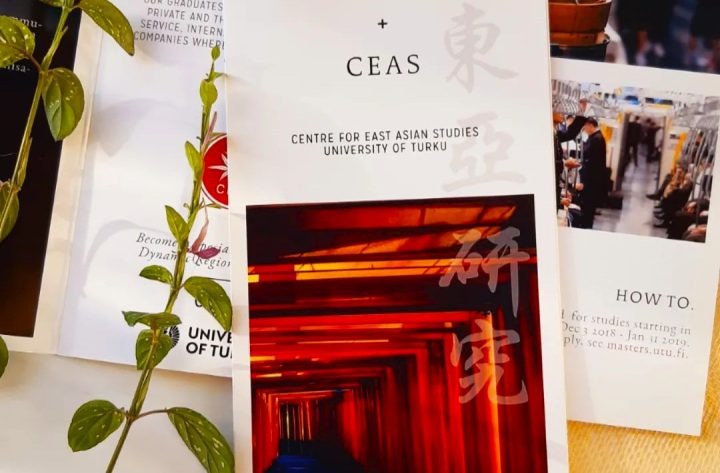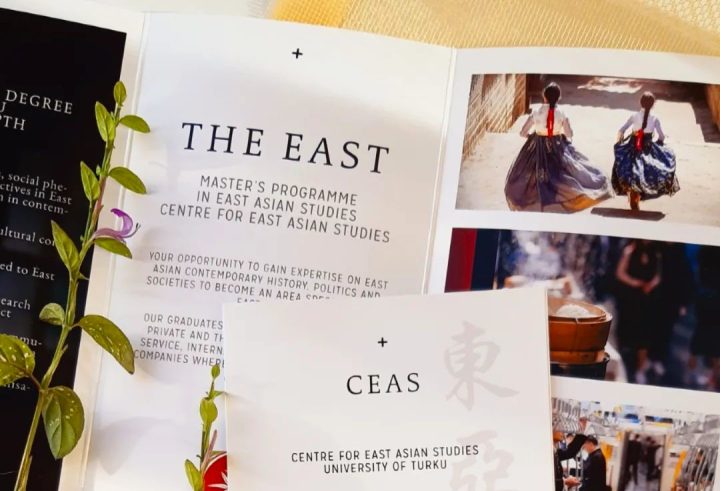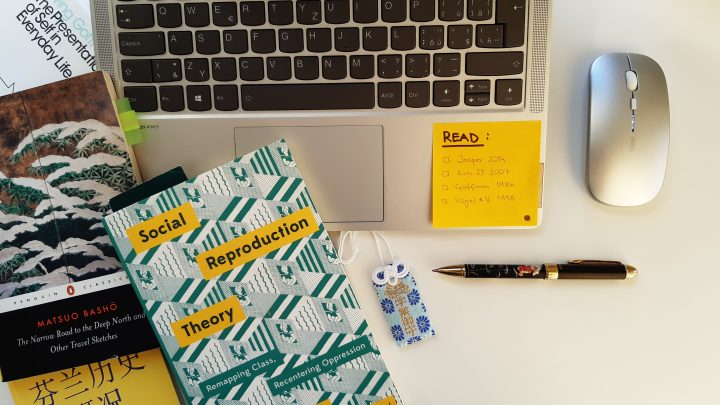Writing a thesis at UTU: Tips, tricks, and experiences from four East Asia students
Love it or hate it, a thesis is something most of us have to go through if we want to get our hands on the much desired degree certificate, and it can be a great source of excitement and stress. Each university sets different standards for their students’ theses, and so does each department. In hopes of assuaging some of those fears, this is your short introduction to writing a master’s thesis at the Centre for East Asian Studies, featuring interviews and advice from four current and alumni students of MDP in East Asian Studies. Even if you’re not in this department, do have a look – it may yet contain some useful tips!
What does it mean to write a master’s thesis in East Asian Studies?
A CEAS thesis is basically an essay of roughly 20.000 words (this differs by department!) which features original research connected to social studies and East Asia. You certainly have options here in terms of topic and method; you may study Korean single mothers via interviews, public opinions on Japanese foreign policy through newspaper articles, or portrayals of masculinities in Chinese dramas. Working individually or collaborating is possible, your thesis is in English, and if you’re planning to graduate on time, you submit the final work in approximately May of your second year.
Keep in mind, though, that many students extend by a semester or a year to have more time, so there is no reason to panic if two years seems like a short time. This may be harder if you are a tuition-paying student, but it is nonetheless an option.

How is the thesis-writing process?
You begin working on your thesis in the first month of your degree, which may seem too early but I promise you, it’s much better than starting your last semester with only a vague idea. Each semester has a mandatory Research Seminar and optional Shut Up and Work sessions to guide you and, well, poke you into action.
You will write a literature review and a research plan in your first year to help you figure out what it is exactly that you want to study and how you’ll do it. These early plans are not set in stone, though, and as every lecturer (and researcher) will tell you, plans rarely work out 100% and flexibility is key. In your second year, you typically collect data, analyse them, and then write everything up into a neat, double-spaced document with your name and thesis title on top.
“Articulating, speaking out loud, and answering questions was helpful in figuring things out.” – Stanislav (2nd year)
“Starting is the hardest. Happily going from watching The Witcher to searching for data? Sounds impossible.” – Kristyna (2nd year)
“The easiest part is immersing yourself in the interesting articles and books that you find.” – Aurora (1st year)
“Without our teachers’ wisdom and support, I don’t think I would have ever finished my thesis.” – Maria (alumni)
All this starts with having a topic. While you needn’t have an exact one in the beginning of your studies, do give a ten-minute thought to which country and roughly what issue you’d like to focus on. In your very first Research Seminar, you’ll be paired with a supervisor based on that country and topic.
Your supervisor is essentially your Yoda, who discusses and refines your topic, method, and theory with you, so that when you start planning and writing, you know how to. They also guide you when you are in doubt or just plain lost, and can be of immense help; do communicate with them. However, supervisors are not bosses – they do not tell you exactly what and when to do. Your thesis is as much a trail of your independent organisational skills as it is of your writing and academic prowess.

This may all seem overwhelming and, in the beginning, it is. Although, apart from the Research Seminars, Shut Up and Work sessions and your supervisors, you can also ask other students at CEAS for their experiences. After admission, you will be assigned a student tutor and put in a WhatsApp group, and later, you can also join the TaoTao student organisation, which is primarily for East Asian Studies.
In these groups, contacting other students for advice and help is easy. However, since you may be curious about some of us now, here are some impressions, reviews, and advice from four current and alumni CEAS students.
Aurora: I’m Aurora from Finland, a first-year Master’s student at CEAS. I am expecting to graduate in fall 2025 because I’m planning on going for an exchange to Japan in spring 2025. My thesis topic has to do with the birth rates in Okinawa: Okinawan birthrates have always been a bit higher than in the rest of Japan, a country famous for its ageing population, and I would like to find out why.
Kristyna: I’m Kristyna from the Czech Republic, and I’m in my second year. My thesis is about the displays and construction of masculinity in Japanese figure skating.
Stanislav: My name is Stanislav, 31 years old, born and raised in Russia. My previous educational background (2010-2015) is translation/interpretation and linguistics, and I am graduating from the UTU this year. My thesis is China’s risk management: Comparative study, Examples of Russia, Iran and Venezuela.
María: I am María! I am from Spain and I submitted my thesis in March 2024. My thesis is focused on South Korea, specifically transnational consumption of K-pop and K-dramas.
Aurora: In order to get the supervisors assigned, we were asked to choose a country (China, Korea, or Japan) and a tentative topic on the first week of our studies. That was a bit scary, but the teachers have reassured us that change of topic is possible and if it happens, it’s not the end of the world. My country choice was Japan, and for a while I was considering far-right movements in Japan before settling on my current topic.
Kristyna: It was really difficult, and I did change it in my second semester, from single mothers in Japan to masculinity in skating. It meant discarding a lot of my literature review, but I’m much happier writing about skating, since it’s much more interesting to me and not nearly as depressing as the Japanese social security system.
Stanislav: Choosing a topic for my paper was rather difficult. I started with Sino-Russian relations, which was too broad. Afterwards, I thought about focusing on energy cooperation between the two countries, but after reading some materials, I realized that I could not really bring anything new to the area and I was not really interested in going too much into detail about petroleum products, crude oil etc. As for now, I think I would like to compare the PRC’s approaches vis-à-vis other sanctioned petrostates such as Russia, Iran, and Venezuela. However, in the process of writing, I might consider changing the topic and the scope.
María: Choosing a topic was not the most challenging task because I was certain that I wanted to do something related to the positive outcomes of the transnational consumption of K-pop and K-dramas for South Korea. What was more challenging was narrowing this broad topic down, and finding the right angle to discuss it. I changed my mind several times, even having to alter a big chunk of my thesis after already submitting the research plan and literature review to my supervisor. Re-doing all that was very painful! Do not recommend.
Aurora: I am really bad at guessing how much time any task might take, but the good thing in CEAS is that we have research seminars dedicated to the thesis in every term, so it gets done little by little in about two year’s time. While writing might only take a couple of months, reading and thinking also take their time.
Kristyna: I’d really not recommend going with a couple of months. It took me a semester to just find and read enough journal articles for the literature background, not to mention choosing the topic, theoretical framework, doing data collection and analysis, and the actual writing. In total, it took about a year and a half.
Stanislav: I hope to finish my paper by the end of April 2024. As for now, I have a structure through which I will approach my thesis. The actual content will be added around the structure. I think it is feasible since I just want to graduate and I don’t really care about my grade. I do not want to pursue an academic career (PhD), so even if I get a low mark for my thesis, I will be fine.
María: For me (and it sounds crazy) it took two years and a half to finish! When I think about how long it took me to write it I get dizzy… However, it doesn’t have to be like that for everyone. The thesis project is the most important part of my master’s programme here in Turku, so it requires a lot of time and preparation, but other students might be faster than me, or are happy with dedicating less time to thesis-writing. To me, the thesis was really important, so I decided to dedicate a bit of extra time to it.
Aurora: For me, personally, the hardest part has been narrowing down the topic so that the thesis is achievable.
Kristyna: Starting any of the activities that you’re supposed to be doing. It’s easy to carry on reading/writing/analysing when you’re already doing it, but going from watching The Witcher to searching for data? Verging on impossible.
Stanislav: The whole process of writing my thesis is painful for me, especially when I want to focus on international relations instead of quantitative/qualitative surveys/questionnaires/interviews. We have had a whole course of methodology that I considered a waste of time for me personally, and I wish we had a course on theories and approaches in international relations.
María: For me, the hardest part was figuring out the theoretical framework. I was not able to make a definitive choice until the late stages of the thesis writing process, which stressed me quite a bit and significantly delayed my thesis. Next time, I would try and make this decision much earlier, because I also feel it affected the overall quality of my thesis.
Aurora: The easiest part is immersing yourself in the interesting articles and books that you find during your research.
Kristyna: You hold the reins to your thesis. I didn’t want to talk to people for my data, so I work with newspapers instead. I only want to write a passable thesis instead of an excellent one, so my supervisor and I plan for that. You can choose fairly freely.
Stanislav: I cannot recall any part or stage in particular that was easy.
María: I wouldn’t say that any part of the thesis was easy to write, but there were definitely parts that were so enjoyable that I forgot about the arduousness of the process! I absolutely loved interviewing my informants. When I was doing that stage of the thesis, it felt like everything I had been doing before made sense!
Aurora: Right now I think I’m in a good place with my research plan. I usually take a lot of time deciding things related to the thesis, but once I set my mind, it stays. I could improve my scheduling, though, like start gathering data and literature earlier, so I wouldn’t be so stressed later.
Kristyna: I would’ve looked into theoretical frameworks much earlier than I did. It solved a lot of my angle/methodology issues, but I only dedicated time to it at the start of my last semester.
Stanislav: I am still in the process of figuring out the time framework and approach.
María: Planning, planning, planning! I feel like I am quite a flexible person, so I tend to go with the flow and not make strict plans. While this is very positive for enhancing creativity and allowing for unexpected findings (which is a priority for me!), I feel like a bit more planning before the data gathering process would have made my life much easier during later stages of thesis-writing.
Aurora: While doing my literature review last fall, I created a document for all the articles relevant to my topic. I also downloaded them immediately to my own laptop, and named them to match the list. When it was time to write, it was easy to pick out the right articles and just copy-paste the name of the article into the reference list.
Kristyna: For articles and data, use Notion. You can create databases of journal articles, tag each entry, and search via sorting functions. Plus, Notion is free. For yourself, plan in small, doable steps before you begin. You’re more likely to read a chapter than a book, and you get a sense of accomplishment from ticking it off.
Stanislav: I keep different articles on different topics in different folders: for example, all articles related to Sino-Iranian relations are saved in the folder “Iran”. All the finished materials are stored in separate folders, e.g. “Finished reading/ Iran”.
María: Well, I feel I should be the one getting advice on that realm! If I ever do research again, my number one priority will be making a bigger organisational effort, especially on the literature review part. Even if it seems like an unnecessary hassle, right from the very early stages of thesis writing, start taking notes on every article you review and save each article even if you just briefly took a look at it (you’ll never be able to find it again!). Your future self will wholeheartedly thank you.
Aurora: I owe so much to my supervisor. She has given me great advice regarding my topic, data, and in general just what to expect when studying Japan. My coursemates have also been very important; it’s good for your own mental wellbeing to hear how everybody else is doing and knowing you aren’t the only one having problems and insecurities. For me, Shut Up And Work sessions have been the time and place when I get most done during my studies, I highly recommend them!
Kristyna: That has to be my supervisor, Yoko Demelius. She’s very supportive without being over-optimistic, and we both like to get straight to the point. It’s been great working with her and I would’ve struggled a lot without her.
Stanislav: Our professors and teachers, especially Lauri Paltemaa, Kamila Szczepanska and Silja Keva, provided very helpful feedback which helped me, to some extent, to narrow down my research topic. During my exchange in Taiwan, I met many students conducting actual international relations research with whom I could discuss my thesis. Articulating, speaking out loud, and answering questions was helpful.
María: There were so many people that contributed to this thesis in so many different ways. Of course, my supervisor Dr. Sabine Burghart was such a big support. Although I did not believe in myself, she always did! Other teachers at CEAS were also always available, and I remember very fondly the reassuring thesis-related conversations I had with Dr. Yoko Demelius and Dr. Kanako Kuramitsu. Without their wisdom and support, I don’t think I would have ever finished my thesis. Furthermore, the support, advice, ideas, and feedback from my classmates and friends at CEAS was absolutely essential. I highly recommend having thesis-related conversations with your classmates!
Aurora: It’s just a thesis. Okay, I do want to write a very good thesis and I’m willing to work for it, but it is also good to keep in mind that there is a life outside of writing a thesis, and especially after it.
Kristyna: Have a sit down with yourself and genuinely think about what thesis you want/need to write. There’s no reason to stress yourself over thesis-writing excellency if you’re never going to need that thesis after graduation.
Stanislav: My recommendation is quite obvious, but I realized it quite recently: after reading materials on a specific topic, write the corresponding (sub)chapter on this topic right away, do not put it off until later. Secondly, if you are stuck, try discussing the topic with others. During my stay in Taiwan, I asked one Indian pal, a PhD researcher, how to measure the strategic value of any given country, and he told me about the concept of “comprehensive national power”. Although I could not just adopt the concept and use it for my research, the concept served as a source of inspiration and led me to other ideas and concepts.
María: From all this I learnt an important lesson: always listen to your professors! They insisted a lot during our master’s programme classes that one should have a defined research plan (including the theories) before starting the data gathering process… and it is definitely like that! I found it the hard way. Also: You can do it! A good thesis is a finished thesis! Good luck 🙂
In the end, writing a thesis at CEAS is much like writing it anywhere else – there are readings, data, ideas, setbacks, and parts that are more on the easy side balancing those that may be harder. Whether you look forward to writing your thesis, are indifferent to it, or actively dread it, just remember that there is support available in many forms, that you have time, and most of all, by having been admitted to CEAS, you have the skills to see your thesis done. And if you still have some lingering fears: come talk to us CEAS students on WhatsApp! I promise we’re nice 🙂

